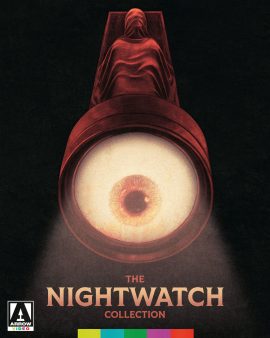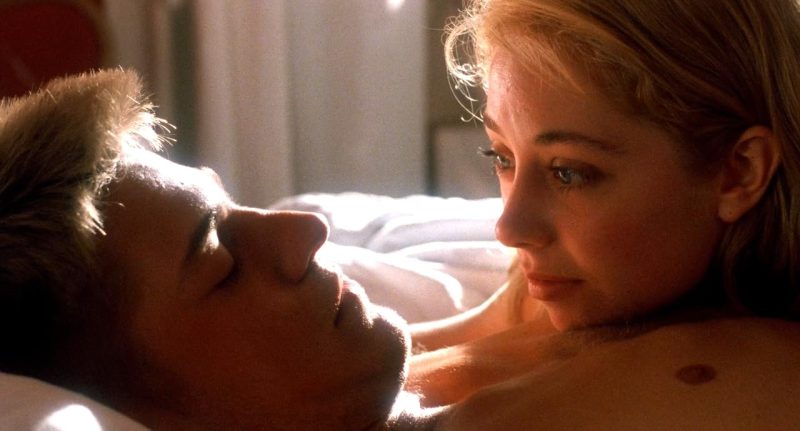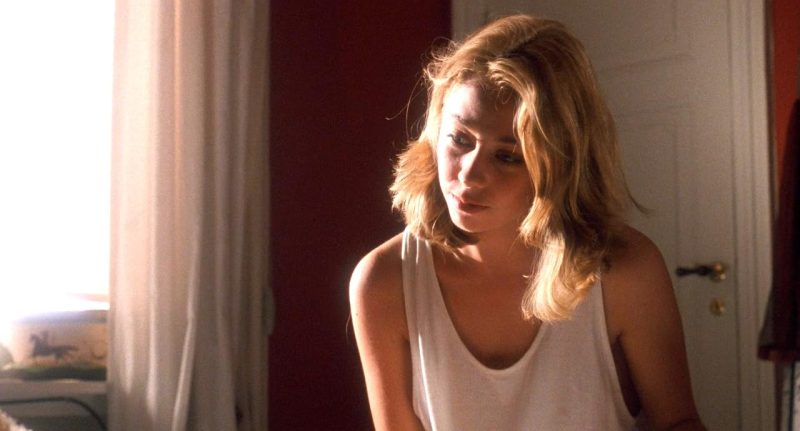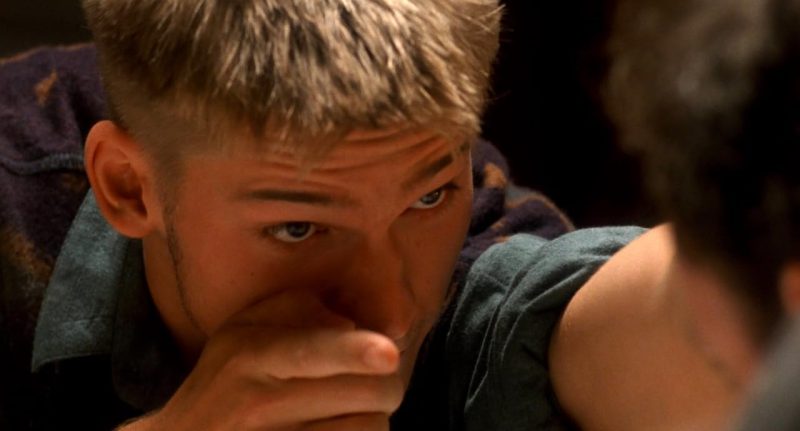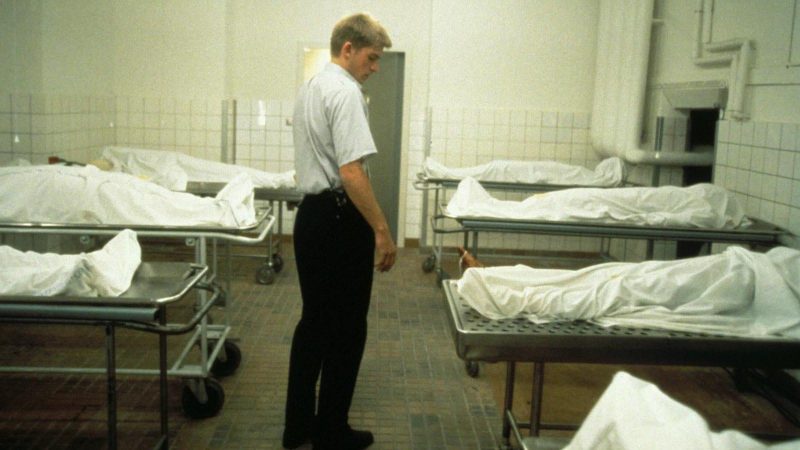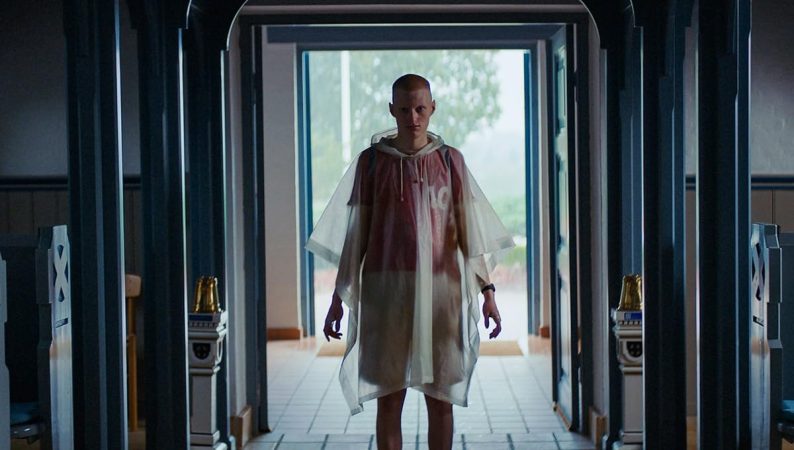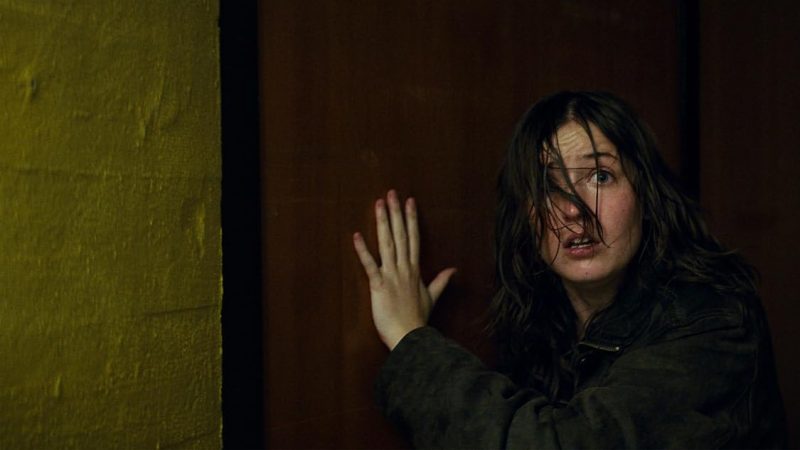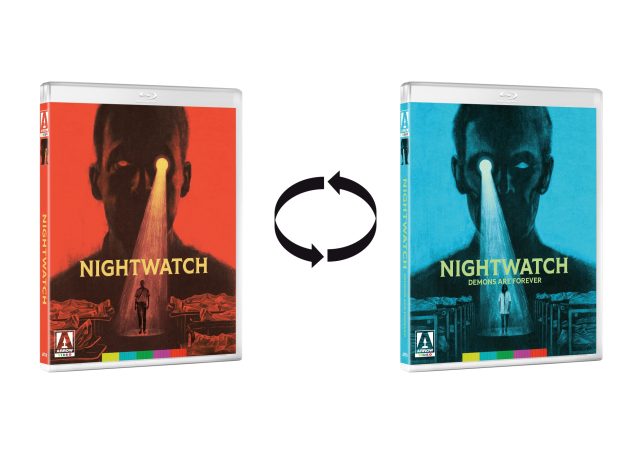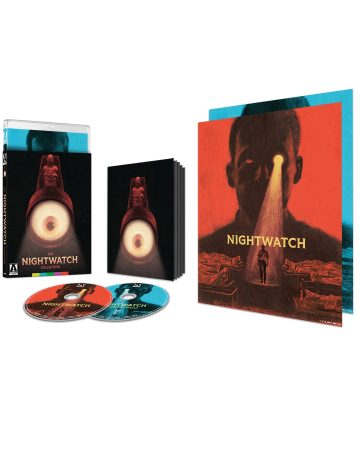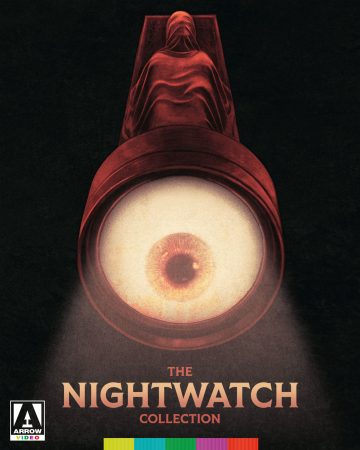Estimated reading time: 11 minutes
Table of contents
- A Claustrophobic Classic: Nightwatch (1994)
- Premise & Setting: The Morgue’s Oppressive Grip
- Narrative Engine: Paranoia and External Threat
- Performances: Anchoring Fear & Suspicion
- Atmosphere & Craft: Building Dread
- Legacy & Significance: Beyond Danish Borders
- Conclusion: An Enduringly Effective Thriller
- Facing the Past’s Shadow: Nightwatch: Demons Are Forever (2023)
- Legacy & Premise: Trauma Passed Down
- Confrontation & Unleashed Fury: Igniting the Past
- Atmosphere & Suspense: Familiar Halls, Renewed Dread
- Performances: Haunted Past, Determined Present
- Themes: The Inescapable Past & Consequences
- Conclusion: A Worthy, Chilling Successor
- The Video
- The Audio
- The Supplements
- The Final Assessment
A Claustrophobic Classic: Nightwatch (1994)
Ole Bornedal’s Nightwatch (Nattevagten) stands as a defining piece of 1990s Danish cinema, expertly blending psychological horror, Nordic noir tension, and a uniquely unsettling atmosphere. This thriller, propelled by a breakout performance from Nikolaj Coster-Waldau, remains a masterclass in building dread within a single, terrifying location.
Premise & Setting: The Morgue’s Oppressive Grip
The film’s central concept is brilliantly simple and deeply unnerving. Law student Martin Bork (Coster-Waldau) takes a night watchman job at Copenhagen’s Forensic Medicine Institute, believing the quiet will be perfect for studying. However, the reality is a descent into profound unease. The morgue setting, inspired by Bornedal’s own visceral experience, becomes the film’s most potent character. The sterile corridors, the echoing silence punctuated by unsettling sounds, and the ever-present proximity of the deceased create an atmosphere thick with palpable dread. Bornedal masterfully contrasts the mundane city life outside with the chilling finality within the institute’s walls, amplifying Martin’s growing isolation and paranoia.
Narrative Engine: Paranoia and External Threat
Nightwatch expertly weaves two threads of tension. The first is Martin’s internal battle against his own mounting fears within the inherently creepy environment. Every shadow, every unexplained noise feeds his anxiety. The second is an external threat: a series of brutal murders targeting women across Copenhagen. The genius of the plot lies in how these threads intertwine. The investigation into the killings outside inevitably brushes against the isolated world of the morgue, creating circumstances that place Martin under intense scrutiny. The film masterfully explores the vulnerability of someone trapped both physically within a frightening workplace and psychologically by growing suspicion.
Performances: Anchoring Fear & Suspicion
Nikolaj Coster-Waldau delivers a compelling and intensely physical performance as Martin. He convincingly charts the character’s journey from initial bravado through escalating terror and desperation, making his fear utterly relatable. The supporting cast provides crucial grounding and layers: Sofie Gråbøl as Martin’s concerned girlfriend Kalinka, Kim Bodnia as a detective drawn into the case, and Ulf Pilgaard as a police officer. Rikke Louise Andersson deserves special mention for her Bodil Award-winning portrayal of Joyce, an eccentric character whose presence adds another dimension of unsettling energy to the morgue’s nocturnal world.
Atmosphere & Craft: Building Dread
Bornedal’s direction excels in sustaining suspense. He prioritizes psychological terror over graphic violence, utilizing the morgue’s architecture, sound design (dripping water, distant sirens, echoing footsteps), and stark lighting to generate relentless unease. The film’s power lies in its ability to make the audience feel Martin’s isolation and vulnerability viscerally. It’s a testament to the filmmaking that the setting itself becomes a primary source of horror.
Legacy & Significance: Beyond Danish Borders
Nightwatch was a phenomenal success in Denmark, resonating deeply with audiences and selling over 465,000 tickets. Its impact extended internationally, showcased at prestigious events like the Cannes Film Festival’s Critics’ Week and Rome’s Fantafestival. Its cultural importance is solidified by its inclusion on Kosmorama’s list of the Top 100 Danish Films. While director Bornedal modestly viewed it as legitimizing genre storytelling within European cinema rather than “a great work of art,” its influence is undeniable. This is further evidenced by the 1997 English-language remake (also directed by Bornedal) and the recent 2023 sequel, Nightwatch: Demons Are Forever, reuniting key original cast members decades later.
Conclusion: An Enduringly Effective Thriller
Nightwatch succeeds through its masterful atmosphere, a perfectly realized and terrifying setting, and a central performance from Nikolaj Coster-Waldau that anchors the escalating panic. It taps into primal fears of darkness, isolation, and being watched, amplified by the uniquely morbid environment of the morgue. While some contemporary reviews noted its adherence to certain thriller conventions, its execution – the suffocating tension, the psychological depth, and the sheer effectiveness of its premise – remains potent. Nightwatch is a cornerstone of Danish genre cinema and a highly recommended, genuinely chilling experience for fans of psychological horror and Nordic noir.
Facing the Past’s Shadow: Nightwatch: Demons Are Forever (2023)
Ole Bornedal returns to the chilling world of his 1994 Danish classic with Nightwatch: Demons Are Forever (Nattevagten – Dæmoner går i arv). This long-awaited sequel isn’t merely a rehash but a potent exploration of inherited trauma and the terrifying consequences of digging up a buried past, set once again within the foreboding walls of the Forensic Medicine Institute.
Legacy & Premise: Trauma Passed Down
Decades after the harrowing events of the first film, the nightmare resurfaces through a new generation. Emma (Fanny Leander Bornedal), a 22-year-old medical student, deliberately takes the infamous night watchman job at the very morgue where her parents, Martin (Nikolaj Coster-Waldau) and his then-girlfriend, nearly met their end at the hands of the psychopathic police inspector Wörmer. The aftermath shattered her family: her mother died by suicide, and her father Martin is a haunted shell, numbed by tranquilizers and unable to confront the memories. Emma’s motivation isn’t just a job; it’s a desperate, perhaps reckless, quest for truth about the events that destroyed her parents’ lives and continue to poison her own.
Confrontation & Unleashed Fury: Igniting the Past
Motivated by a need for answers Emma cannot get from her traumatized father, she tracks down and confronts the now-incarcerated Wörmer. This act, however, proves catastrophically misguided. Instead of closure, it acts like a spark to dry tinder. Emma inadvertently reawakens Wörmer’s dormant, terrifying bloodlust and provides him with a renewed, vicious purpose: exacting violent revenge on everyone he holds responsible for his downfall decades prior. Her search for truth ignites a fresh wave of terror.
Atmosphere & Suspense: Familiar Halls, Renewed Dread
Bornedal masterfully recreates the oppressive, clinical dread of the morgue setting. The familiar, echoing corridors and cold storage rooms regain their power to unsettle, serving as both a physical workplace and a potent symbol of the family’s unresolved trauma. The film effectively builds tension by leveraging the audience’s knowledge of the original’s horrors while introducing new threats born from Emma’s actions. The suspense stems not just from immediate danger, but from the horrifying realization of the monster she has recklessly unleashed upon herself and others connected to the past.
Performances: Haunted Past, Determined Present
Nikolaj Coster-Waldau delivers a powerfully subdued and heartbreaking performance as the older Martin, a man fractured by unspeakable loss and guilt, his pain etched deeply. Fanny Leander Bornedal stands strong as Emma, convincingly portraying her character’s mix of determination, vulnerability, and the terrifying realization of the consequences she has set in motion. The return of other original cast members like Kim Bodnia (Jens) and Ulf Pilgaard (Wörmer) adds significant weight and continuity. Pilgaard, in particular, embodies a chilling, vengeful menace.
Themes: The Inescapable Past & Consequences
The film delves deeply into the destructive nature of unresolved trauma and how it echoes through generations. Emma’s quest for understanding, while relatable, becomes a cautionary tale about the dangers of forcing buried darkness back into the light. It explores the heavy cost of past violence and the terrifying reality that some demons never truly die; they merely lie in wait. The concept of legacy – both the one left by parents and the one created by monstrous acts – is central.
Conclusion: A Worthy, Chilling Successor
Nightwatch: Demons Are Forever successfully balances being a satisfying sequel for fans of the original with a compelling standalone psychological horror-thriller. It smartly shifts focus to the next generation while respecting the legacy characters and their pain. Bornedal crafts a tense, atmospheric film fueled by strong performances, particularly the poignant dynamic between Coster-Waldau and Bornedal. While perhaps lacking the sheer groundbreaking impact of the 1994 film, it delivers effective scares, genuine emotional weight, and a potent exploration of the enduring scars of violence. It proves the demons of the past are indeed “forever,” waiting for a chance to strike again. A must-watch for Nordic noir and psychological horror enthusiasts.
The Video
Arrow doesn’t provide much information on the transfer for these films other than to say the feature masters were produced by AMC. Nightwatch is presented in a 1.85:1 AVC 1080p encodement and Nightwatch: Demons are Forever in a 2.39:1 AVC 1080p encodement. The original film is grainier and grittier, but looks organic and well presented in this release, with good detail and shadow nuance. The sequel looks glitzier, cleaner, but is just as visually alluring and masterfully presented with a cinematic appearance, detailed textures and natural tones.
The Audio
The Danish DTS-HD Master Audio 5.1 sound mix for each Nightwatch film is appropriately atmospheric and engaging for these sorts of thrillers. They aren’t bombastic, but they help to create the tension with a far-off sound, reverberation, and the balance of the score and contemporary rock.
The Supplements
Arrow balances this release with a collection of interviews and new video essays, plus its usual gorgeous packaging and a reversible sleeve.
Limited Edition Contents:
- Reversible sleeve featuring newly commissioned artwork for both films by Peter Strain
- Double-sided foldout poster featuring newly commissioned artwork for both films by Peter Strain
Illustrated collector’s booklet featuring new writing on the films by Eva Novrup Redvall
Bonus Features:
Nightwatch:
- Commentary by Ole Bornedal
- The Making of Nightwatch (1080i upscaled; 00:28:13)
- Not Afraid of the Darkness (1080p; 00:16:56) – An interview with Nightwatch cinematographer Dan Laustsen
- Death in Denmark (1080p; 00:14:09) – An appreciation of Nightwatch and Nightwatch: Demons are Forever by critic and Nordic Noir specialist Barry Forshaw.
- Danish Trailer (1080p; 00:01:32)
- German Trailer (1080p; 00:01:32)
- English Trailer (1080p; 00:01:33)
Nightwatch: Demons are Forever:
- (NEW) How the Nightwatch Films Explore the Horrors of Adulthood (1080p; 00:17:45) – A video essay by film critic and horror specialist Heather Wixson.
- (NEW) Life (and Death) on Mars (1080p; 00:22:23) – A video essay by author and film critic Alexandra Heller-Nicholas on the intersection of public and private life in the Nightwatch films.
- Trailer (1080p; 00:02:07)
The Final Assessment
Nightwatch was one of the early successful Nordic Noir or Scandi-Noir films to make a splash and put the genre on the map. It still holds up well today and its sequel, coming three decades later, is a successful and bold entry. I would love to see either of these films on 4K but in the absence of that, these Blu-ray discs are solid releases.
The Nightwatch Collection (Limited Edition) is out on Blu-ray July 22, 2025 from Arrow Video
- Rating Certificate: Not Rated
- Studios & Distributors: Thura Film | DR Fiktion | Obel Film | Det Danske Filminstitut | Nordisk Film Production | Arrow Video
- Director: Ole Bornedal
- Written By: Ole Bornedal
- Run Time: 107 Mins.
- Aspect Ratio: 1.85:1 (Nightwatch) | 2.39:1 (Demons are Forever)
- Video Format: AVC 1080p
- Primary Audio: Danish DTS-HD MA 5.1
- Subtitles: English
- Street Date: 22 July 2025


